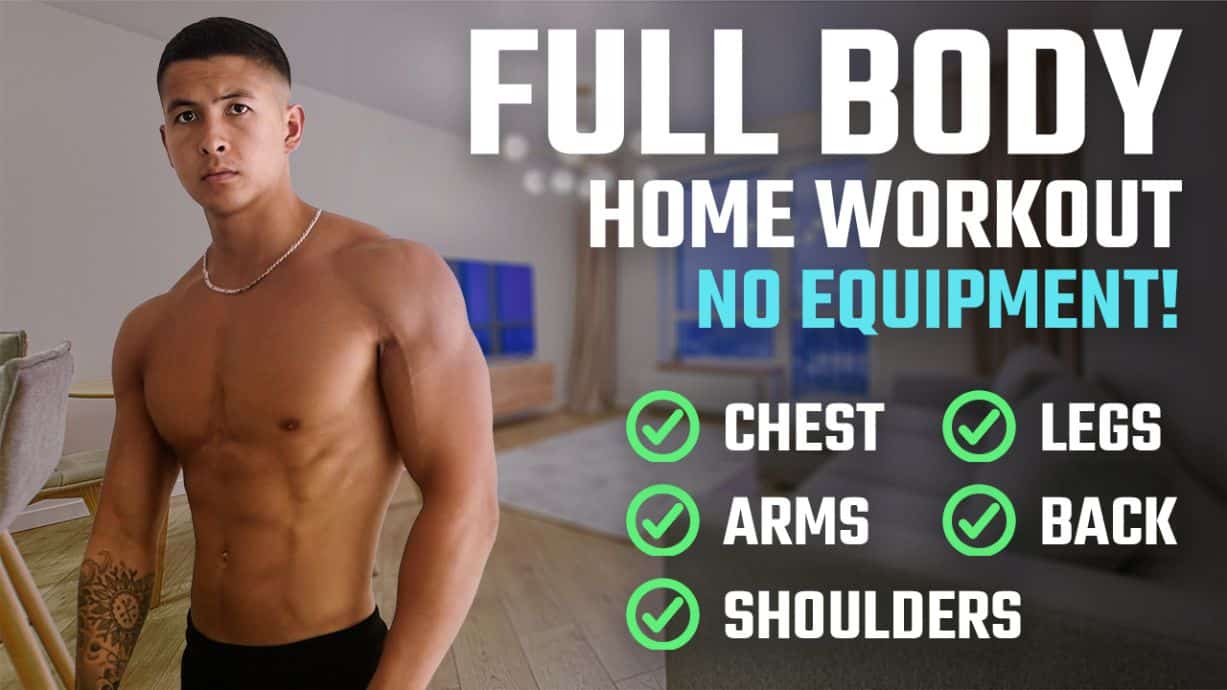

Typically, when we think of full body workout at home routines where you’re more or less limited to using your bodyweight, we automatically assume that they’re inferior for muscle growth when compared to working out at a gym, where you have access to heavy weights. And I’m not gonna lie. For most home bodyweight workouts out there, this is true. And they are in fact inferior for growth. But, this is simply because they aren’t designed properly.
Because time and again, research has shown that in both untrained and trained individuals, you can make comparable gains in muscle mass by using either:
But the catch is that there’s a couple of key points that people overlook when it comes to home workouts. And these are key to ensuring that you’re still able to maximize your growth despite being limited to just your bodyweight.
These key points are essential that you incorporate into the full body workout at home routine (no equipment) I’ll be showing you today.
By the way: these are the exact key points (plus more!) accounted for in every single BWS program, no matter if it is a home-based or gym-based routine. I've designed all training programs to help transform your physique in the most time-efficient manner. And best of all? It's all rooted in science. For more information:
Click the button below to take my analysis quiz to discover the best program for you:
First (and arguably most important), is that you need to push to near failure for every single set you perform in this workout.
Research has shown that if you stop well short of failure during your sets when using lighter loads, you’ll fail to fully activate all the motor units within your muscles. And, as a result, you won’t experience the same amount of growth that you would when using heavy weights. Therefore, during each set of this workout you want to push as close to failure as possible.
That means till you genuinely have just a couple reps left in the tank before you wouldn’t be able to perform another rep with good form due to muscle fatigue. Now this will be very uncomfortable given that we’ll be working with a higher rep range. But it’s essential that you push through if you truly want to maximize your growth with this full body workout at home routine.
Research has indeed shown that working with higher reps and lighter loads like with your bodyweight, for example, can lead to comparable growth as heavier weights in the gym do. But it seems that there is a low end cut off to this. If you train with loads or use a resistance that is too light, then you won’t be able to maximize growth.
Which seems to be right around 30-40% of your 1 rep max. Meaning that you need to be working with a weight or resistance that is at least 30-40% of your 1 rep max if you want to maximize growth during each of your sets.
Admittedly, this is easier to calculate when using weights. But since we’re just using our bodyweight in this workout, we’ll want to convert this to reps. So, 30-40% of your 1 rep max equates to around 30-40 reps per set.
Accordingly, if you’re able to perform MORE than 30 or 40 reps during each set of the exercises I show below when pushing to near failure, then it’s an indication that you aren’t using resistance or variation that’s difficult enough.
And you’ll want to instead use one of the progressions that I’ll show you to make the movement more demanding. So ideally you shouldn’t be reaching over 30-40 reps during any of your sets in this full body workout at home routine.
Now that we have that covered, we’re ready to dive into the full body home workout plan. It's designed to train all of your upper body and lower body musculature in a proportionate manner.
I’ll first go through the various exercises and how to perform them. And then I’ll cover your options in terms of how to best execute the workout.
Targets: Chest, triceps
Replaces: Bench Press
The first exercise we’ll use here is narrow grip push-ups. Here, your hands will be placed in a diamond shape. This better targets the chest and triceps. Three EMG papers (here, here, here) have confirmed that this specific hand placement elicits significantly greater chest and triceps activation when compared to a shoulder-width or wide hand placement during the push-up.
We’ll perform 4 sets of these in total:
To progress this movement:
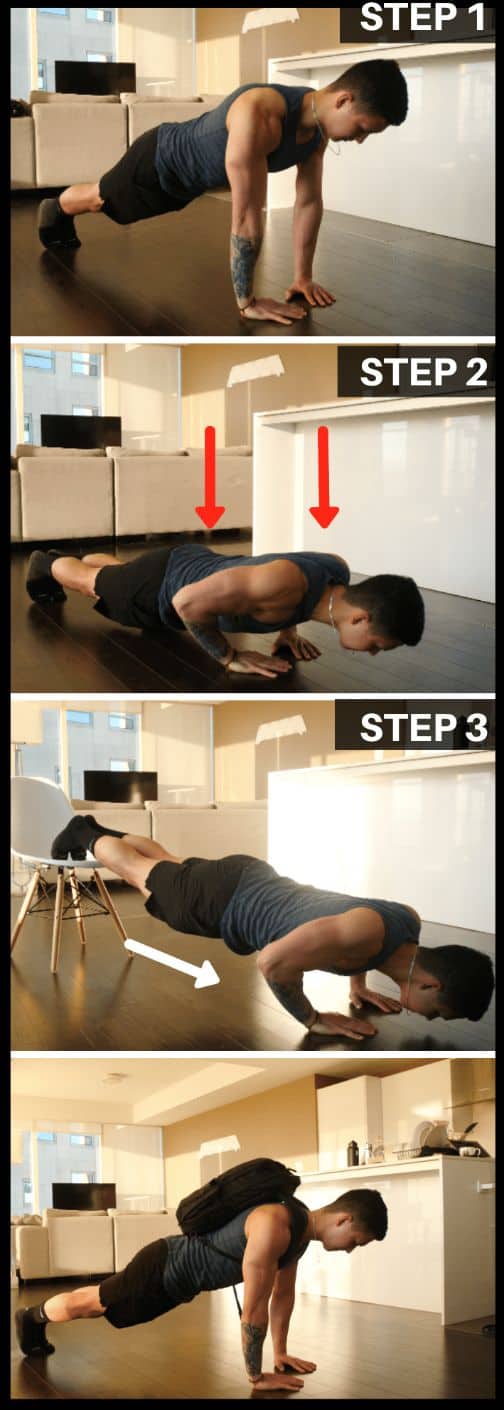
Targets: Traps, lats, & biceps
Replaces: Seated row, barbell row, etc.
Next, we’re going to move onto the inverted row to target our overall back. Most of the emphasis will be on the mid-back for thickness. Ideally, for the most resistance, you should use a broom or mop and place that between two chairs to perform your row. If you don’t have the right setup for that though, then you can simply perform these under a sturdy table.
To make both of these movements easier, you can start out with bent knees to use your legs for support. A third option is the following set up instead which we’ll continue to use later on in this workout:
This will enable you to perform your row.
To progress this movement:
For whichever variations you choose, you can progress them by either:
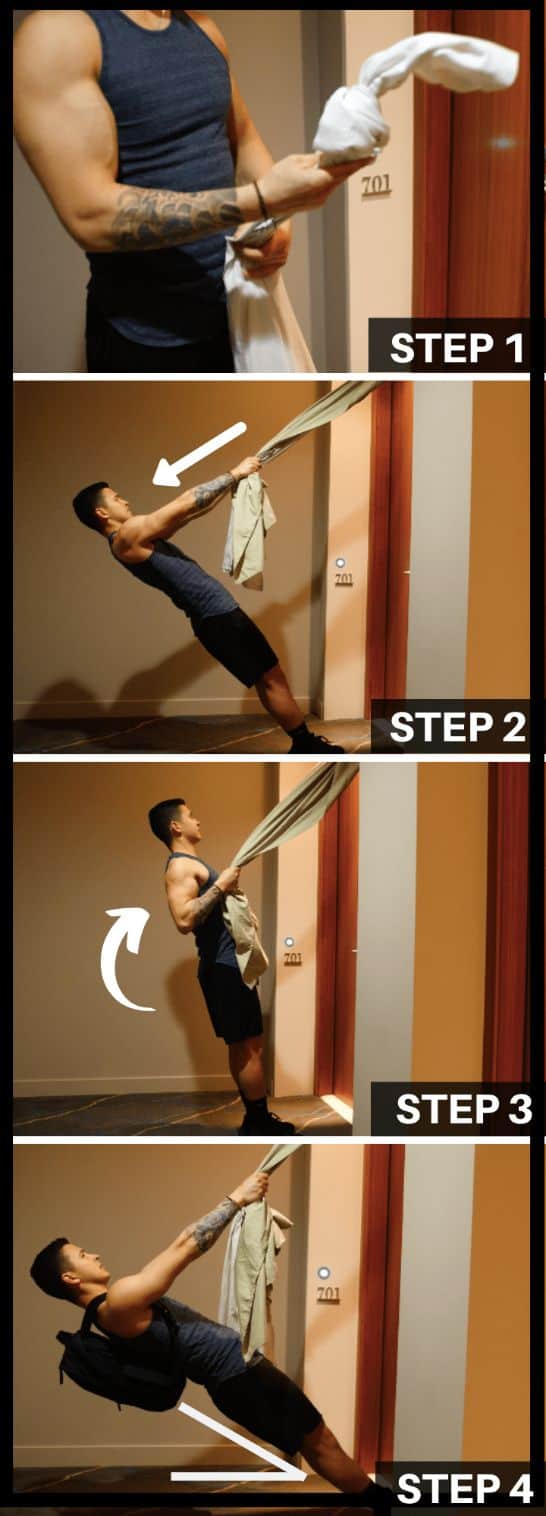
Targets: Shoulders, triceps
Replaces: Shoulder Press
Next, we’ll be moving onto something called pike push-ups. These mainly target the shoulders and triceps. For these:
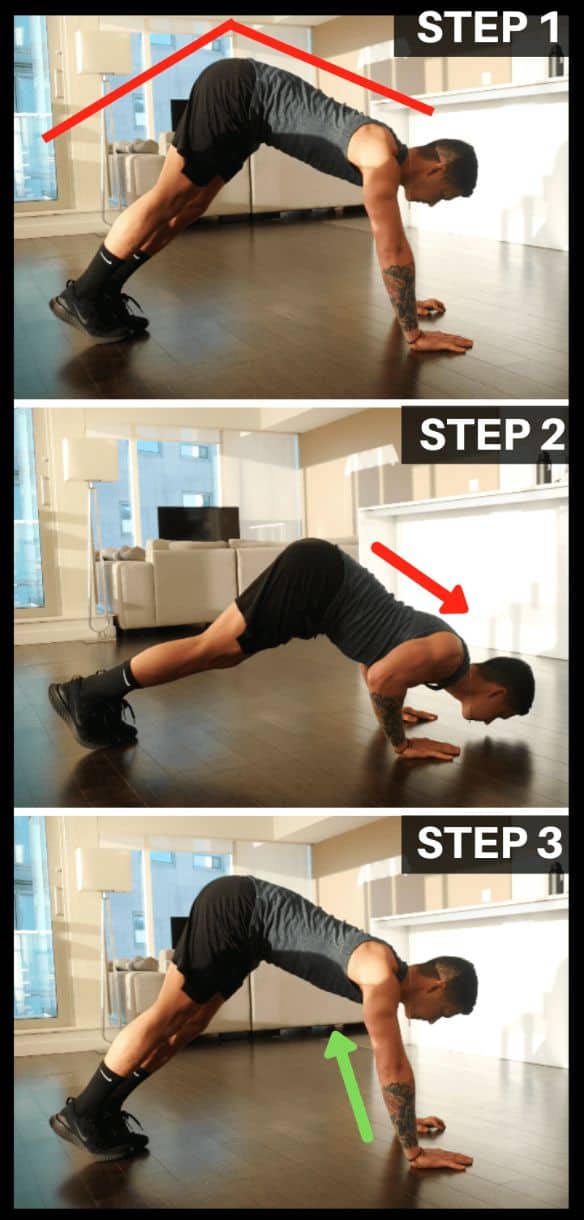
Just like with the overhead press, your elbows should not flare out sideways. Keep them tucked and vertical over your wrists as you descend.
To progress this movement:
You can first simply elevate your feet up to the edge of a platform. To progress this even further, you can move your hands closer to the feet. This will make the movement considerably harder.

And then, again, repeat the process of elevating your feet onto a higher platform once you’re ready. I’d recommend marking down with tape how far your hands are from the platform so that you’re able to accurately gauge your progress over time.
Targets: Lats
Replaces: Lat pulldowns, pull-ups
Next, it’s time to target the back (primarily the lats). We'll do so with a vertical pulling angle, rather than horizontal, as we did earlier. This one is bound to get you weird looks around the house. But is worth it for the return in back gains in provides. Simply lay on a smooth surface and use something for grip on your hands, like shoes, for example. Then, you simply perform a lat pulldown motion by pulling your elbows down to slide your body up. You should feel your lats working as you do so.
To progress this movement:
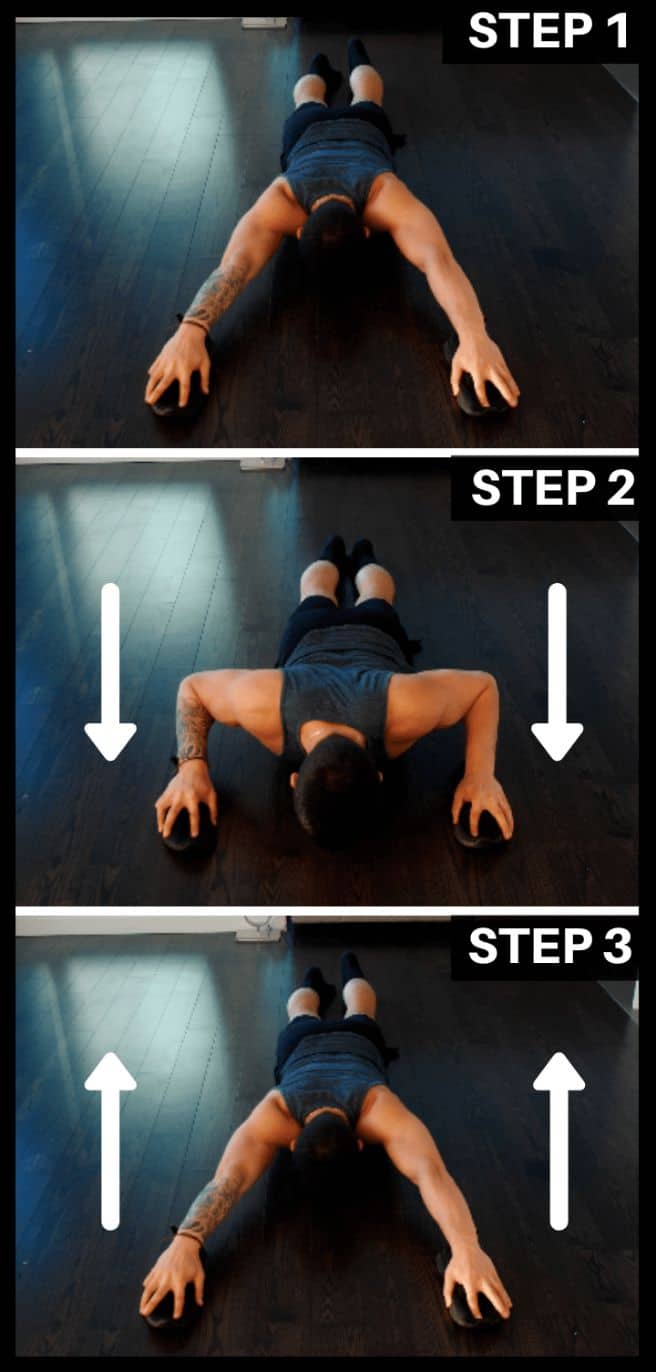
Knowing which exercises can target specific muscle groups is challenging - especially when you don't have access to the typical gym equipment. Luckily, our BWS coaches are super-knowledgeable in this and can name at least 5 different exercises you could do without equipment for each muscle group! To see how BWS 3-on-1 coaching can help:
Click the button below to find out more about the 3-on-1 coaching program:
Targets: Biceps
Replaces: Bicep Curls
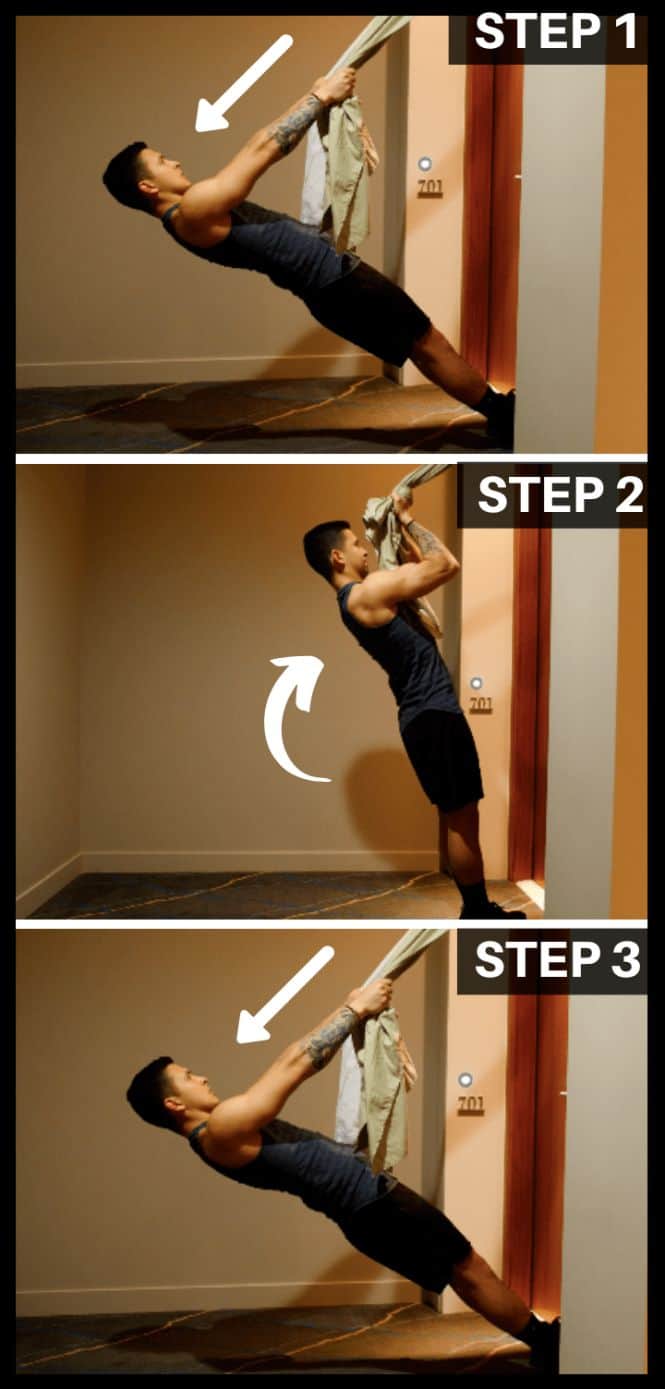
Now, it’s time for some arms isolation. Go back to your bed sheet or towel setup and lean back with your arms straight. Then, keeping your body straight and elbows locked in position, curl your hands towards your face by using your biceps.
Targets: Triceps (long head)
Replaces: Cable/dumbbell overhead triceps extensions, skullcrushers
Then, to target the long head of the triceps which has yet to be emphasized in this workout, you can simply switch over and perform tricep extensions. Again, you want to keep that elbow locked in place. And your body in a straight line. Alternatively, these can also be done like so on an elevated platform.
To progress this movement:
You can progress them a few ways by:
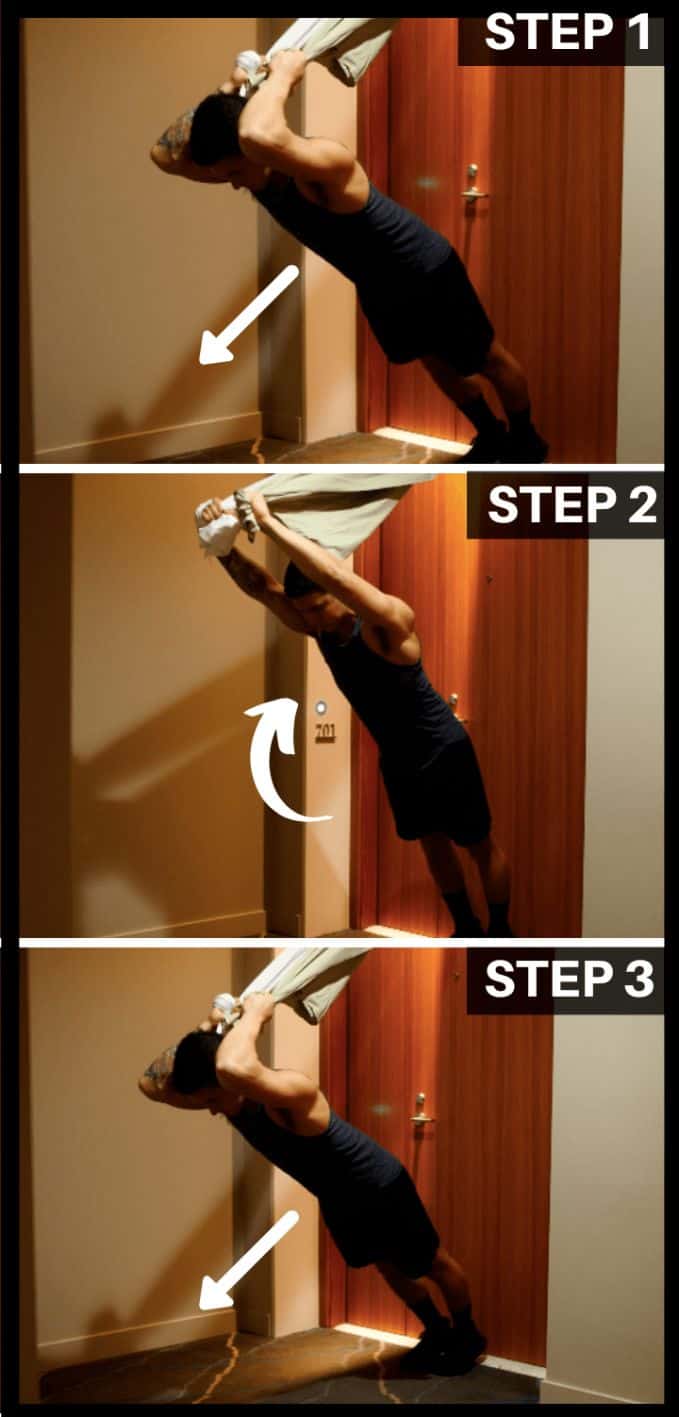
Targets: Quads & Glutes
Replaces: Barbell squats
Next, it’s time to move onto the lower body. And for most of us, bodyweight squats just aren’t going to cut it. Which is why we’ll use the bed sheet set up again to perform assisted pistol squats. This exercise will help to target the quads and glutes. To perform these:
At first, you can use your arms to pull yourself up for assistance if needed.
To progress this movement:
But over time, you can progress it by either:
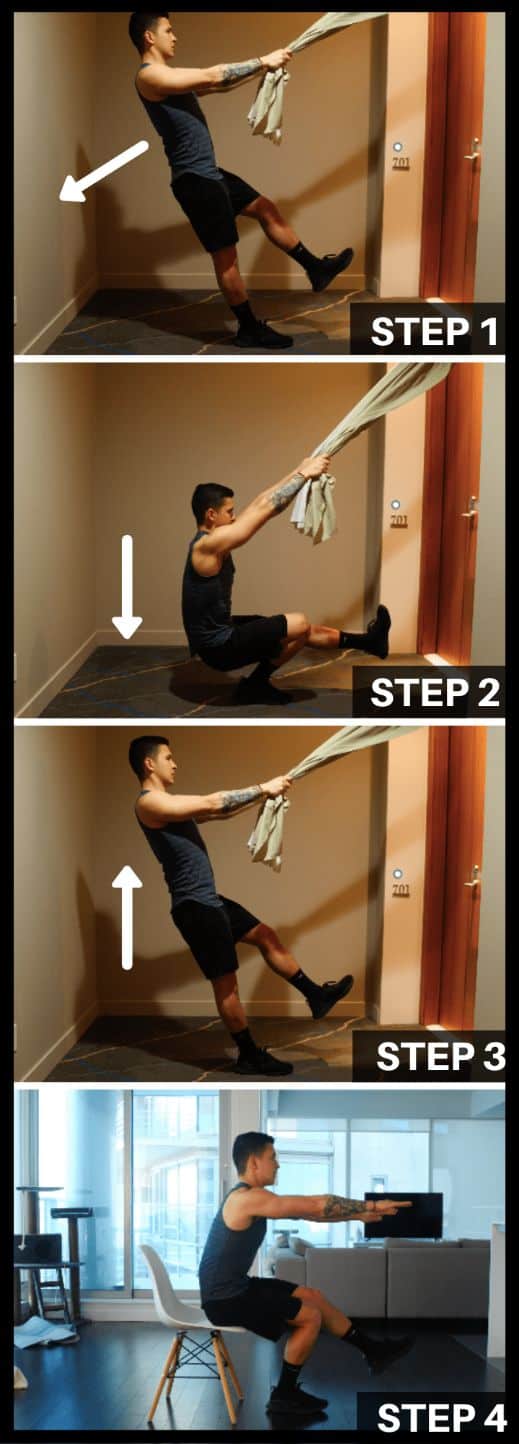
Targets: Quads & Glutes
Replaces: Split squats, lunges
Next, we’ll move onto an exercise you’re probably familiar with: the Bulgarian split squat. With your rear leg elevated on a platform, this exercise will again further target the quads and glutes.
To progress this movement:
To progress this, you can simply hold a weighted backpack at your chest. Once that gets too easy though, a more difficult progression is the assisted shrimp squat:
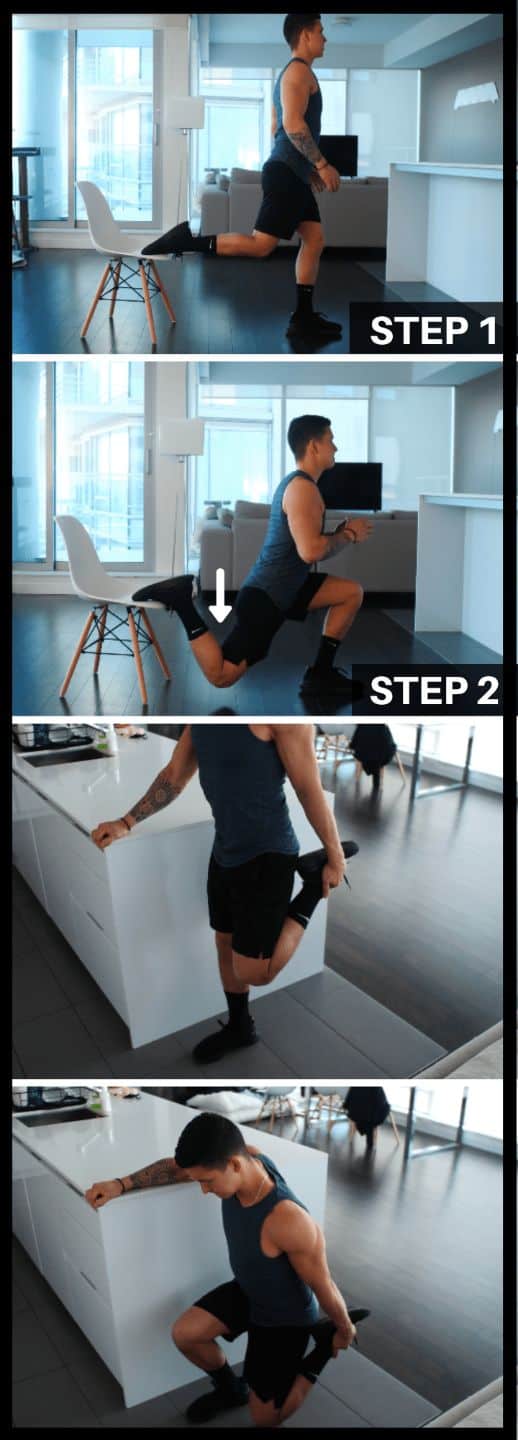
Targets: Hamstrings
Replaces: Machine hamstring curls
Next, we’ll use the sliding leg curl. This exercise will help work the hamstrings through both hip and knee extension. To perform these:
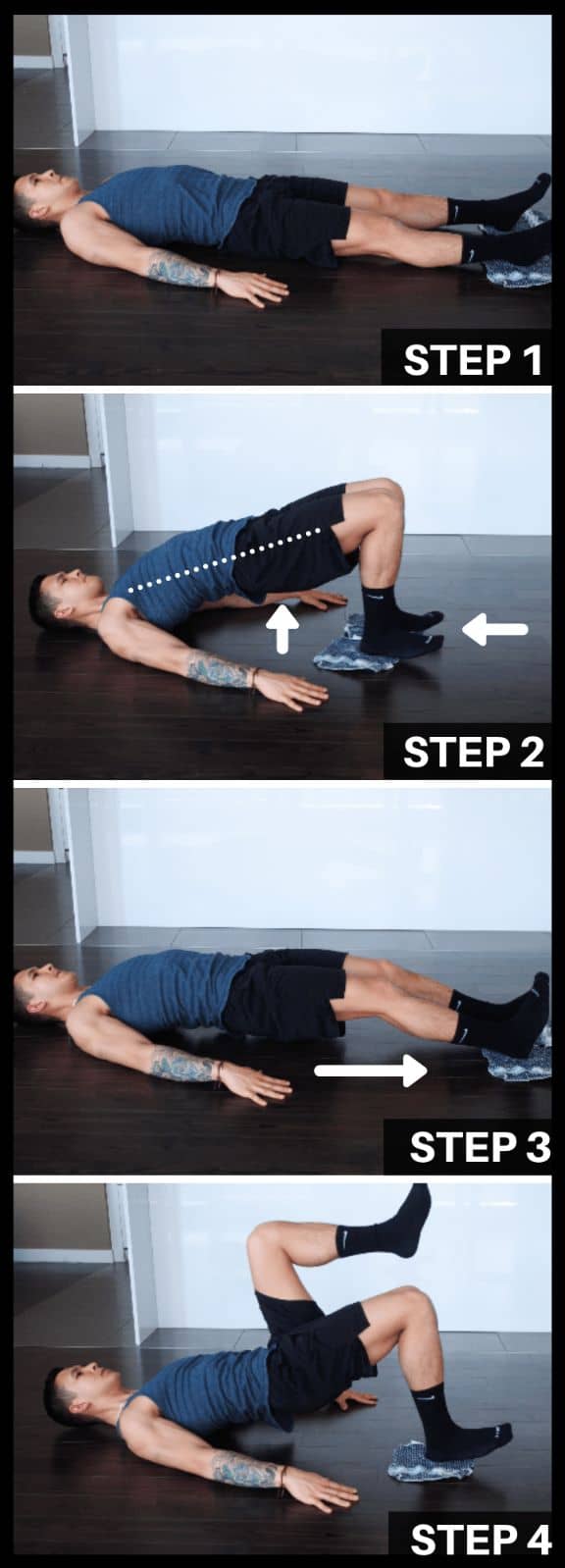
To progress this movement:
To progress this, you can slow down the tempo and/or perform them with one leg at a time.
Here's a summary of the full body home workout:
Diamond push-ups: 4 sets (2 flat, 2 decline)
Inverted row: 4 sets
Pike Push-ups: 3 sets
Sliding Lat Pulldowns:3 sets
Biceps bed sheet curl: 2 sets
Tricep bodyweight extensions: 2 sets
Assisted pistol squat: 3 sets each side
Bulgarian split squat 3 sets each side
Hamstring leg curls: 4 sets
Now when performing it, just like your exercises in the gym, it’s vital that you get adequate rest of roughly 2 minutes between each of your sets. And to do so in this workout while saving time, you can perform the following upper body exercises in a superset fashion as shown below.
SUPERSET:
Diamond Push-Ups: 4 sets – 2 flat, 2 decline
Inverted row: 4 sets
SUPERSET:
Pike Push-ups: 3 sets
Lat pulldowns on floor: 3 sets
SUPERSET:
Biceps bed sheet curl: 2 sets
Tricep bodyweight extensions: 2 sets
NORMAL SETS:
Assisted pistol squat: 3 sets each side
Bulgarian split squat 3 sets each side
Hamstring leg curls: 4 sets
So, for example, you'd perform a set of the push-ups, rest for 30-45 seconds, then go right into a set of the inverted row, rest for 30-45 seconds, and then go back to the push-ups and repeat.
By strategically using this agonist-antagonist superset method with the appropriate upper body exercises, research has shown that you’ll be able to save time while ensuring that your performance on your sets doesn’t suffer.
And for the rep ranges, again you need to push to near failure each set. Which is why I haven’t given a specific number of reps as it’ll vary for everyone.
So jot down how many reps you performed for each set, try to beat those numbers in your next workout, and use the progressions as needed once you’re reaching over 30 reps per set.
As for frequency, I’d recommend performing this workout 3-4 times a week. This will ensure each of your muscles are worked at the optimal number of sets required to maximize growth.
Lastly, I’ve compiled this beginner-friendly at-home workout into an easy to download, free mobile-friendly PDF for you to use for reference while you’re performing it. It’ll show you the workout, tutorials, proper progressions, and more.
To get a copy of it:
Click the button below to download the full body workout at home routine PDF:
Guys, I hope you enjoyed this one! And I also hope you were able to see that it’s the little details like what I went through in this video that really is key to maximizing growth and to actually see progress with whatever workout routine you choose to do.
And for a step-by-step program that takes care of all the guesswork for you and shows you exactly how and what to work out and eat week after week so that you can fuel your body and build muscle most effectively with science:
Click the button below to take my analysis quiz to discover the best program for you:
Stay safe, everyone! Don’t forget to give me a follow and connect with me on Instagram, Facebook, and Youtube as well, in order to stay up to date with my content.